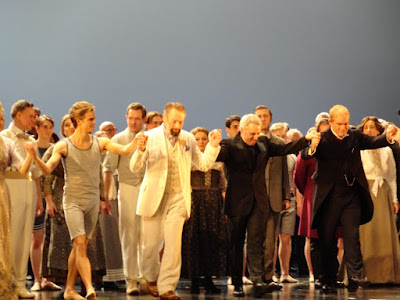A última ópera de
Benjamin Britten, Morte em Veneza (segundo a obra
homónima de Thomas Mann) foi apresentada pela Royal Opera de Londres
numa encenação de David McVicar.
O escritor alemão
Gustav von Aschenbach viaja para Veneza na procura de inspiração criativa. No
hotel impressiona-se com a beleza de um jovem polaco, Tadzio, que
está de férias com a família. Observa-o diariamente na praia, onde brinca com
outros rapazes, e segue-o nas ruas de Veneza, mas não lhe consegue falar. Reconhece
que está apaixonado por ele. Surgem notícias de um surto de cólera em Veneza, a
maioria dos turistas abandona rapidamente a cidade, sucedem-lhe uma série de
incidentes mas a obsessão por Tadzio impede-o de partir. No dia em que a
família polaca sai do hotel, von Aschenbach observa o rapaz mais uma vez na
praia, este luta com outro e, quando se levanta para tentar parar a luta, cai
morto.
A encenação de
McVicar é excelente. A acção decorre na época e o guarda roupa é magnífico. O
palco tem uma série de colunas móveis e os cenários são muitos e dinâmicos,
permitindo acompanhar perfeitamente a acção: o escritório de von Aschenbach na
Alemanha, as viagens de Gôndola e os canais, os vários cenários no hotel, as
ruas de Veneza, a Praça de São Marcos, a praia no Lido, tudo aparece em
cenários bem conseguidos.
Apenas achei a encenação escura no início (o nevoeiro
nos canais é excelente, mas a ópera só “escurece” na segunda metade).
Nesta produção o Tadzio não é um rapaz mas um homem jovem e todas as cenas passadas na praia são coreografadas e interpretadas (ao mais alto nível) por bailarinos, o que beneficia muito o espectáculo.
Nesta produção o Tadzio não é um rapaz mas um homem jovem e todas as cenas passadas na praia são coreografadas e interpretadas (ao mais alto nível) por bailarinos, o que beneficia muito o espectáculo.
Dirigiu a Orquestra da Royal Opera o maestro Richard Farnes.
O tenor Mark Padmore foi excelente como Gustav
von Aschenbach. Está quase sempre em cena e manteve a qualidade interpretativa
sem vacilar até ao final. Tem uma dicção perfeita, das partes quase faladas às
mais cantadas, tudo tão perceptível que dispensaria legendas.
Outro cantor de
nível excepcional foi o barítono Gerald
Finley nas 7 personagens que representa. Tem um timbre bonito, a voz é
magnífica, e interpretou as diferentes personagens com um cariz específico para
cada uma. À parte desta ópera, foi também homenageado por completar 30 anos de
interpretações na Royal Opera.
O contratenor Tim Mead esteve também irrepreensível
na interpretação de Apollo.
Leo Dixon, que interpretou o Tadzio, é um jovem bailarino
do Royal Ballet que dançou superiormente. A coreografia (de Lynne Page) é óptima.
(os bailarinos)
(os bailarinos)
A música de
Britten não é fácil, mas foi um excelente espectáculo.
****
DEATH IN
VENICE, Royal Opera House, November 2019
Benjamin Britten's last opera, Death in Venice (according to the homonymous novel by Thomas Mann)
was presented by the Royal Opera in
a production by David McVicar.
German
writer Gustav von Aschenbach travels to Venice for creative inspiration. At the
hotel he is struck by the beauty of a young Polish boy, Tadzio, who is
on holiday with his family. He watches him daily on the beach, where he plays
with other boys, and follows him on the streets of Venice, but cannot speak to
him. He realises he is in love with him. There is news of a cholera outbreak in
Venice, most tourists leave the city quickly, a series of incidents follows,
but his obsession by Tadzio keeps him
from leaving. The day the Polish family leaves the hotel, von Aschenbach
watches the boy once again on the beach that fights with another boy. When he
gets up to try to stop the fight, he falls dead.
McVicar's
staging is excellent. The action takes place at the time and the dresses are
magnificent. The stage has a series of moving columns, and the scenery is
dynamic, making it perfectly possible to follow the action: von Aschenbach's
office in Germany, the gondola rides and canals, the various parts in the
hotel, the streets of Venice, St. Mark's Square, the beach in Lido, all appear
in well-done scenarios. I just found the staging dark at first (the fog in the
canals is great, but the opera only “gets dark” in the second half). In this
production Tadzio is not a boy but a young man and all the scenes on the beach
are choreographed and performed (at the highest level) by dancers, what is good for the show.
The Royal Opera Orchestra was conducted by Richard Farnes.
Tenor Mark Padmore was excellent as Gustav
von Aschenbach. He is almost always on stage and has maintained interpretive
quality without wavering until the end. He has a perfect diction, from almost
spoken parts to the most sung, all so clear that it would require no subtitles.
Another
exceptional level singer was baritone Gerald
Finley in the 7 characters he performs. He has a beautiful tone, the voice
is magnificent, and interpreted the different characters with a specific touch
for each one. Apart from this opera, he was also honored for completing 30
years of performances at the Royal Opera.
Countertenor
Tim Mead was also impeccable in
Apollo's interpretation.
Leo Dixon, who played Tadzio, is a young Royal Ballet
dancer who danced superiorly. The choreography (by Lynne Page) is great. Many other actors participated, singing
secondary roles, dancing or acting.
Britten's
music is not easy, but it was a great performance.
****
























Sem comentários:
Enviar um comentário